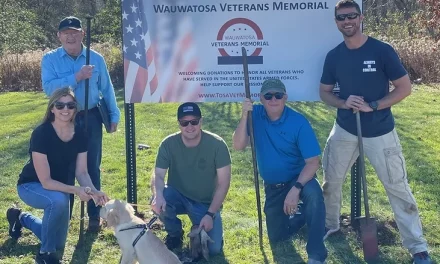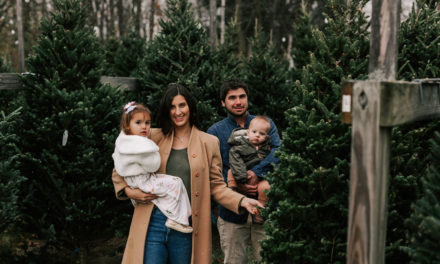Happy Holidays? Those who grieve, struggle through “the most wonderful time of the year”
by Candace Romano, Certified Grief Educator
Right around mid-October, I begin thinking about the holidays.
But while others might have visions of sugar plums, the images in my head are not jolly and bright: I’m trying to picture how to survive another holiday season without my sister Penny.
Penny died five years ago on Nov. 1, All Saints Day, and Thanksgiving and Christmas have never been the same.
Before she died of multiple myeloma, we would plan and share a Thanksgiving meal – and a full day of shopping the day after. Christmas Eve was always held at her Illinois condo, where she’d prepare a themed meal and watch Love Actually with my husband, Rick, Penny’s fiancée, and Penny’s daughter and her now-future husband.
All was calm; all was bright. Not so anymore.
Holidays cannot – and shouldn’t be – the same after a loved one dies. But how do we recapture that spirit?
I know I’m not alone in my holiday angst, and my feelings are not unique. Countless others are trying to accept the harsh reality that joyful memories with a loved one represent Christmas past. Trying to get into the holiday spirit isn’t easy when someone you loved dearly is missing. Many approach Christmas present with trepidation, grudgingly getting through the months just waiting for January 1 to pop-up on the calendar.
While difficult, there are ways to make the holidays meaningful again. But rest assured, they will be different.
Taking Small Steps Forward
After Penny died, I wanted to do something to honor her, and I became a certified grief educator, trying to help understand and process grief by offering support groups. I studied under David Kessler, a world-renown grief expert whose website, grief.com, gives many ideas on how to find pleasure in the holiday season.
Here are a few of his tips:
- Do be gentle with yourself and protect yourself.
- Don’t do more than you want, and don’t do anything that does not serve your soul and your loss.
- Do allow time for the feelings.
- Don’t keep feelings bottled-up. If you have 500 tears to cry don’t stop at 250.
- Do allow others to help. We all need help at certain times in our lives.
- Don’t ask if you can help or should help a friend in grief: just help. Find ways; invite them to group events or just out for coffee.
- Do, in grief, pay extra attention to the children. Children are too often the forgotten grievers.
Kessler, who lost his mother when he was a young boy and his adult son later in life, also said that he always goes into a get-together telling the host, “I can’t stay long.” Beautiful!
My personal tips are to avoid shopping malls – around Christmas you could always find Penny and me looking for good buys – and limit exposure to Christmas carols (good luck with that!)
Some of these tips may work for you, and others may not. You may have your own way.
If you are grieving and don’t belong to a support group, maybe now is the time to join one. I find it comforting to know I’m not alone. It’s been estimated that nearly 60% of Americans grieve at any one time – and that was before COVID. So more than half of all the people you come across on any given day are grieving, too.
When you come across them, be gentle, and be gentle with yourself. Holidays won’t always be as hard as they are in early grief. My hope is that some Christmas I can watch “Love Actually” without crying. My hope for you is that you, despite your grief, find some joy in your holidays.

Alan D. Wolfelt, Ph.D., 365 Days of Understanding Grief
“Holidays, anniversaries, birthdays and other special days are often more painful in grief. On these days, it’s normal for me to especially miss the person who died. I want them present. … On these days, I need to be extra gentle with myself. I will not overextend myself, and I will allow time for rest grief and mourning.”

David Kessler, Grief and Loss Expert
“When you lose someone special, your world lacks its celebratory qualities. Holidays magnify that loss. The sadness deepens and the loneliness can feel isolating. The need for support may be the greatest during the holidays. Pretending you don’t hurt and/or it isn’t a harder time of the year is just not the truth for you. But you can – and will – get through the holidays. Rather than avoiding the feelings of grief, lean into them. It is not the grief you want to avoid, it is the pain. No one can take that pain away, but grief is not just pain, grief is love.”
Currently, I’m offering two free education/support group meetings:
Mondays, 1-2:30 p.m. St. Matthew’s Lutheran Church, Wauwatosa and Wednesdays, 3-5 p.m. BayShore Lutheran, Whitefish Bay
Individual sessions can also be arranged, and all are welcome, regardless of religious affiliation.
You can’t speed up the grieving process; it is as individual as you are. But sharing in a supportive community will help you feel less isolated and know that you are not alone.
CONTACT:
Candace Romano
Certified Grief Educator
414-687-2196
candacedromano@gmail.com





